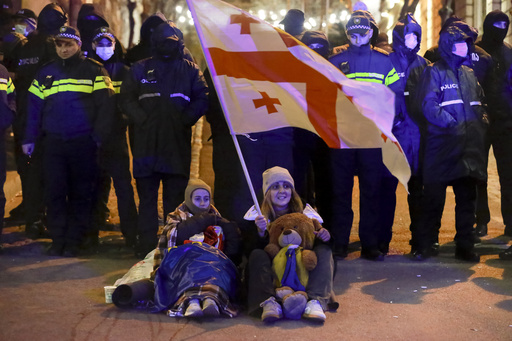
The parliamentary session follows the elections held on October 26, which enabled the Georgian Dream party to maintain control. Many perceived this election as a critical assessment of the nation’s desire to join the European Union.
During the session, only 88 lawmakers from Georgian Dream occupied the chamber, with opposition parties completely absent from the proceedings. Nika Melia, the head of the Coalition for Changes, declared the opposition’s commitment to resist the ruling party, referring to it as a “self-proclaimed government.”
“This conflict represents the struggle of individuals seeking freedom against those intent on solidifying an authoritarian regime,” Melia stated.
President Salome Zourabichvili, who has publicly denounced the election outcomes, also refrained from attending the session. She has contended that the parliament lacks legitimacy, citing evidence of electoral malpractice, and has initiated a lawsuit with the Constitutional Court, claiming that principles of secrecy and universality of the vote were breached.
Outside the parliamentary building, thousands of protesters braved inclement weather, confronting heavy police presence. Student Vakho Sebiskveradze voiced frustration, asserting, “The government has robbed us of our elections. This isn’t merely about electoral outcomes; it’s a theft of the European future from the Georgian people, our nation, and our youth.”
According to the Central Election Commission, Georgian Dream secured around 54% of the voting share in October, dismissing opposition allegations of electoral fraud.
European observers reported that the elections unfolded in a contentious environment, marked by instances of bribery, double voting, and violence.
Critics have highlighted Georgian Dream’s increasingly authoritarian tendencies, labeling it as leaning toward Moscow, particularly given its founding by Bidzina Ivanishvili, a wealthy businessman with deep ties to Russia. The ruling party has recently implemented laws reminiscent of those used by the Kremlin to stifle free speech and infringe upon LGBTQ+ rights.
In June, the European Union decided to suspend Georgia’s application for EU membership indefinitely following the passage of a controversial law by the parliament, which mandates organizations receiving over 20% of their funding from abroad to register as “pursuing the interest of a foreign power.” This legislation mirrors a Russian law employed to undermine organizations critical of the government.
